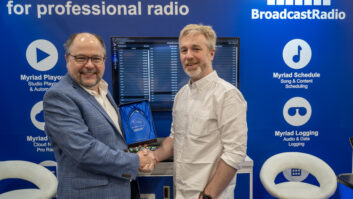Internet royalties, streaming, the possible return of the Fairness Doctrine and, RIAA-backed legislation that would levy a performance fee on local radio stations are sure to be hot topics at the Friday session, “Everything I Need to Know About Broadcast Regulation I Learned in Texas,” 9 a.m.
Web radio stations are worried about copyright royalties imposed by a federal panel; many stations are avoiding streaming copyrighted music until the issue is settled.
Web radio service Pandora recently told The Washington Post that it will go out of business if the continuing dispute over Internet royalties is not resolved.
Rep. Howard Berman,, D-Calif., is trying to broker a deal between webcasters and SoundExchange, the organization that represents artists and record labels. The talks could reduce the per-song rate set by a federal panel last year.
PERFORMANCE TAX
The Copyright Royalty Board last year decided that the fee to play a music recording on Web radio should increase from the current 8/100 of a cent per song per listener in 2006 to 19/100 of a cent per song per listener in 2010.
The decision came as the recording industry is trying to make up for the loss of physical sales of music with download sales.
In a related issue, terrestrial radio does not pay performance royalties, though the record labels think they should. A bill to require broadcasters to pay a performance royalty for airplay on terrestrial stations is not fair, broadcasters told members of Congress earlier this year.
Steve Newberry, Radio Board chair of the National Association of Broadcasters testified in a hearing before the House Subcommittee on Courts, the Internet and Intellectual Property on behalf of the NAB.
Newberry, whose full-time job is president/CEO of Commonwealth Broadcasting, said all broadcasters — urban, rural, religious, public, community, ethnic, large and small — oppose H.R. 4789, sponsored by IP Subcommittee Chairman Rep. Berman.
“Radio is free, radio is pervasive and no one is harming record label sales by stealing music from over-the-air radio,” Newberry said.
The measure has the support of the major record labels; they say radio is not paying its fair share of music royalties compared to satellite radio and radio in other countries.
Newberry said, “Most of these other countries created performance royalties when the broadcasting systems were either government owned and operated, or at least substantially subsidized by tax dollars. Often it was the government who was paying the royalty. The U.S. broadcasting system, however, is predominantly privately-owned and operated and does not receive tax subsidizes.”
NAB calls the performance royalty a tax and notes that broadcasters already pay fees to ASCAP, BMI and SESAC.
Newberry said the measure would hurt small broadcasters, who have suffered from flat revenues for several years.
FAIRNESS DOCTRINE
FCC Commissioner Robert McDowell says the Fairness Doctrine is not dead.
Until the agency abolished the Fairness Doctrine by declaring it to be unconstitutional, a station was obligated to present both sides of a controversial issue. McDowell says reviving the policy is not currently being discussed at the commission, but told the Media Research Center that could change next January when a new administration takes office.
“If this election goes one way, we could see a re-imposition of the Fairness Doctrine. There has been a discussion of it in Congress. It won’t be called the Fairness Doctrine by folks promoting it. I think it will be called something else.”
McDowell believes the issue will become linked with the so-called “net neutrality” debate, which centers on how much control Internet service providers have in regulating the content their customers can access.
NAB supports a bill introduced by Rep. Mike Pence, R-Ind., that would permanently abolish the Fairness Doctrine. Pence is collecting signatures on a petition to force the issue to a vote, but remains shy of the required 218 votes.
SATELLITE RADIO
How could the FCC have approved the satellite radio merger given the satcasters’ combined years of not complying with the commission directive to develop and sell interoperable radios; as well as not complying with Part 15 rules by selling tuners containing overmodulating wireless FM transmitter devices?
These will no doubt be some of the questions attendees will seek answers to.
Together, the newly combined “Sirius XM” has more than 18 million subscribers and constitutes the second-largest radio operator by sales, after Clear Channel.
In a call with Wall Street analysts shortly after receiving the merger approval, Sirius XM Radio Inc. CEO Mel Karmazin said, “We’re going to be the most successful company in radio.”
NAB, noting the tough financial terms the company had to settle for to get the deal closed quickly, and the punishment meted out by Wall Street on the company stock value, didn’t agree.
“With the advent of digital radio and our embrace of the Internet, we’re confident that free local radio will thrive. There is a real question now as to whether satellite radio can sustain a viable business,” said NAB spokesman Dennis Wharton.
Karmazin said the combined company expects to shave some $400 million off expenses in 2009, in part by eliminating duplicative programming and positions. He planned to detail cuts to the executive roster this month.
The new Sirius XM will have “a la carte” radios ready for retail this fall and interoperable radios at retail “a number of months” before the FCC’s nine-month deadline.
As for those pesky overmodulating products, both companies sent letters to subscribers stating that they may have radios that interfere with terrestrial stations and asking customers to contact the companies for free fixes.
©NAB







